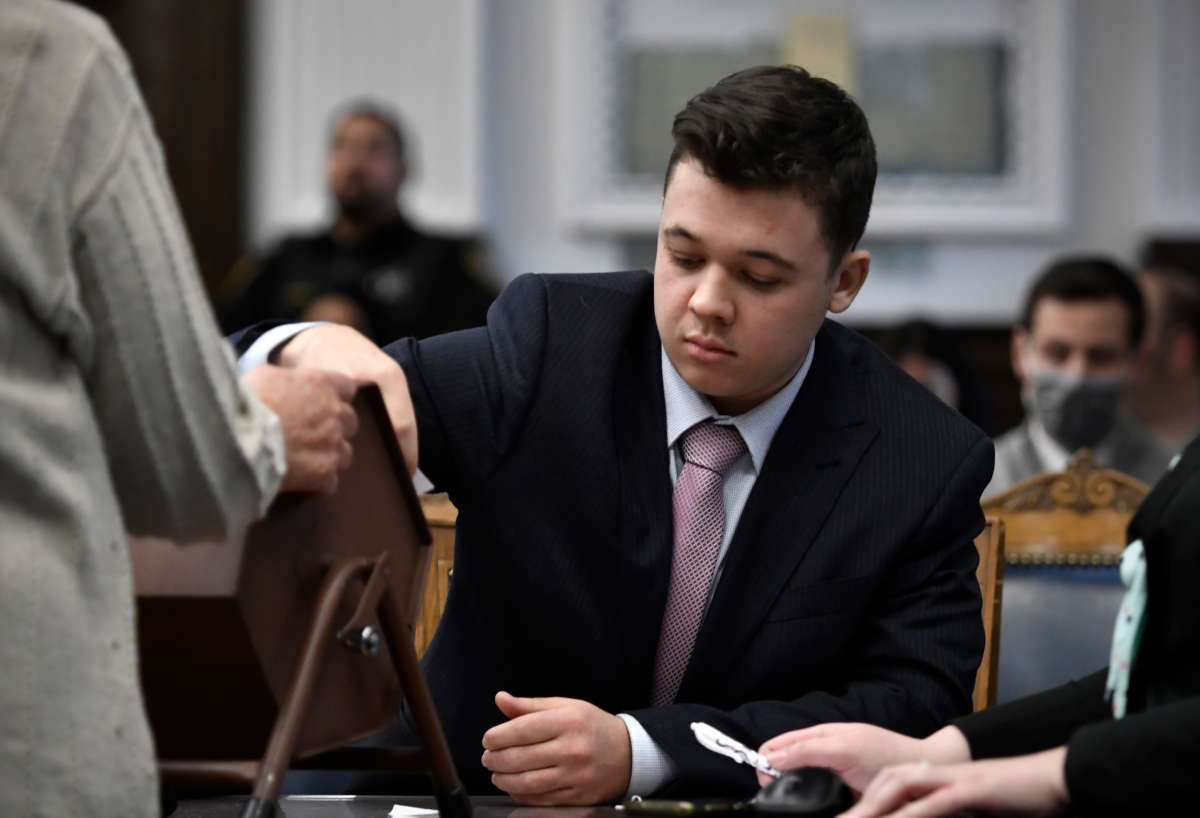Eighteen jurors who heard evidence in the jury trial of Kyle Rittenhouse, an 18-year-old man who is accused of murdering two individuals and injuring a third during an uprising in Kenosha, Wisconsin, last year, were whittled down to 12 on Tuesday, after the judge allowed the defendant to play a role in who should decide his fate.
All 18 jurors’ numbers were written down on slips of paper and placed in a metal raffle tumbler. Judge Bruce Schroeder instructed Rittenhouse to select six slips from the tumbler, stating that those selected would be dismissed, and that the remaining 12 would deliberate over whether the evidence they heard during the trial.
The six jurors that were dismissed were ordered by Schroeder not to discuss the case with anyone and to avoid media reports about the trial, in the rare circumstance that a juror from the 12 deciding the case had to be dismissed. Two jurors have already been dismissed earlier in the trial — one for health reasons, and the other for making a tasteless joke about Jacob Blake, the Black man who was shot several times in the back by a Kenosha police officer. The uprising that followed in the wake of the police-perpetrated shooting was attended by Rittenhouse, who shot three demonstrators, two of whom he is accused of murdering.
Rittenhouse, who was 17 at the time of the shootings, is claiming that he shot the three men — Joseph Rosenbaum and Anthony Huber, the two that he killed, and Gaige Grosskreutz, who survived — out of self-defense.
The decision to have Rittenhouse take part in the selection process of jurors is highly unusual. It is standard practice in Wisconsin trials for a jury to consist of more than 12 individuals and to be reduced to that number at the end of the trial. But typically, it is the judge themselves, or a clerk, that chooses, at random, which jurors will remain.
The 12-member jury began its deliberations on Tuesday. As of 12:30 p.m. on Wednesday, they have not yet reached a verdict in the trial.
John P. Gross, the director of the University of Wisconsin-Madison’s Public Defender Project, speaking to NBC News about the matter, said he’s only seen judges take part in the final jury selection process.
“It’s completely random, and whoever is picking is picking. It was an interesting piece of theater having the judge inviting the defendant to make the draw,” Gross said.
But to others, especially to a number of people on social media, Schroeder’s choice to allow Rittenhouse to seat his own jury drew questions and denunciations.
“It really doesn’t impact the jury that Rittenhouse was allowed to pick the names out of the hat. But the optics are terrible,” said Joe Lockhart, a political analyst for CNN.
It’s “one more move by a Judge who is more interested in getting reelected than dispensing Justice,” Lockhart added.
Indeed, Schroeder has taken a number of actions and issued orders that seem beneficial to Rittenhouse’s defense strategy. Early in the trial, the judge barred prosecutors from describing the men Rittenhouse shot as “victims,” calling the term a “loaded” one that could bias the jury. At the same time, however, Schroeder allowed the defense to describe the three men as “looters,” “rioters,” and “arsonists,” in spite of the fact that they were never charged as such.
Schroeder also dropped a charge of illegal possession of a deadly weapon against Rittenhouse under the questionable rationalization that the Wisconsin statute was unclear to the judge.
The actions the judge has taken have been heavily criticized, viewed as being uneven and biased, increasing the likelihood that Rittenhouse will be acquitted on all charges, according to some observers.
“Judge Bruce Schroeder’s atrocious handling of the #KyleRittenhouseTrial has done new and consequential damage to the tarnished image of Wisconsin’s judicial branch,” said John Nichols, associate editor for the Madison, Wisconsin-based Capital Times.
Join us in defending the truth before it’s too late
The future of independent journalism is uncertain, and the consequences of losing it are too grave to ignore. We have hours left to raise the $12,0000 still needed to ensure Truthout remains safe, strong, and free. Every dollar raised goes directly toward the costs of producing news you can trust.
Please give what you can — because by supporting us with a tax-deductible donation, you’re not just preserving a source of news, you’re helping to safeguard what’s left of our democracy.
